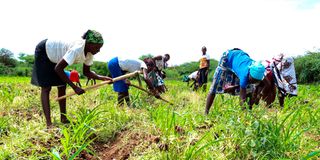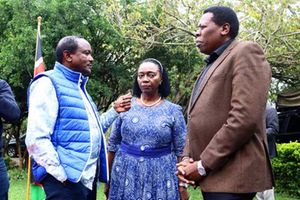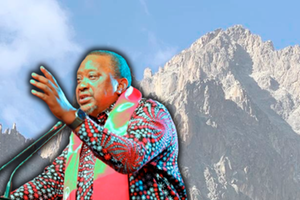Men celebrated in death when big void dawns on families

Manyani widows weed a farm on May 2, 2023. They face difficulties raising their children alone after their husbands, who were their families’ only breadwinners, were killed by bandits.
What you need to know:
- A recurrent theme of widows' accounts is the critical role their husbands played without which some of them have had to downgrade their lifestyles.
- The stories confirmed the proverb that you do not realise the importance of your buttocks until the day they develop a boil.
Superficial gender analysis depicts men as having relatively low workload and responsibility compared to women. But media articles marking this year’s International Widow’s Day painted a different picture.
Besides underlining the essence of the family as a unit where two sexes play complementary roles, they also confirmed the workload of men.
A recurrent theme was that the men left a huge void in the widows’ lives. All the accounts highlighted that the women, who were largely stay-home wives, suddenly found themselves having to provide for families, a role their husbands played singlehandedly before.
The weight of the task was summarised by one widow who remarked that she had to “work ten times as hard to cover his absence”. This is a lesson that even when the husband is financially stable, wives should be actively engaged for income rather than assume that things will remain comfortable indefinitely.
Providing for a family is heavy, encompassing shopping, paying utility bills, settling children’s fees, clothing members, securing a diversified diet and ensuring shelter, whether put up physically, bought or rented. By paying for them, are men not technically the collectors of water and fuel (cooking gas) in many of today’s families?
Roles
Men in families are resident plumbers, electricians, gardeners, security guards, weight haulers, transporters, carpenters, painters and wood splitters. What about their roles in paying the so-called black taxes – sustaining the extended family and in-laws, contributing to funeral expenses and the endless fundraisers, as well as managing the various collective functions? That the patriarchal system largely favours them does not make these roles any less daunting.
Like women’s roles, many of men’s tasks are recurrent. They also require a heavy financial outlay. Yet it is ordinarily assumed that men can always manage. Those unable to fulfil the expectations become laughing stocks. It was clear from the stories that widowhood pulled out the veil on what burdens men bear.
Many of the widows had to downgrade their lifestyles by migrating from urban to rural areas, shifting to cheaper residential quarters, transferring children to less expensive schools and engaging in economic activities they hitherto considered inferior.
For one widow, there were multiple losses in status. One, she became anonymous, her name shifting to the generic “widow”. By the way, what is the word for “widower” in Kenyan languages? Two, she became an object scrambled for by lascivious brothers-in-law, as a matter of cultural entitlement. Three, suppliers and service providers could no longer trust her to take items on loan. Her creditworthiness died with the husband.
Four, fellow women started perceiving her as a potential husband snatcher. For another, debtors refused to settle what they owed the husband, confident that she could not enforce the demands and was defenceless.
Invisible
The bottom-line was that the women were cushioned from all these indignities by the husbands, yet this remained largely invisible when the latter were alive. Death exposed them.
The treatment of widows by in-laws also illustrated the role of men as protectors. Some of the widows cited being blamed for the husbands’ deaths. Others talked of the scramble for property, based on the patriarchal tradition that land and other property remain largely registered in the names of men and are inherited along patrilineal lines.
When men die intestate and without transferring the family property to their wives, widows face myriad problems tracing, claiming and registering the assets in their own names. In anticipation of this, should men not make it a habit to write wills to cushion their families when death calls? This is not to say men will always precede women to the grave. It is only that statistics show that the latter have a longer lifespan.
Kenya has laws dealing with property issues. The Matrimonial Property Act automatically assigns a widow the family residence, to ensure she and the children are not left destitute. But it does not assure widows the automatic right to the husband’s other resources, unless registered in joint names.
The Law of Succession Act deprives a widow who remarries interest in the family’s ancestral property. This ignores that she could be having dependants to nurture using the same. It also assumes that she is covered materially by the new husband, which stereotypes men as default providers.
The law is biased given that widowers do not lose any property rights when they remarry. Most of the women also mentioned that seeking justice was another hurdle, thanks to a tedious legal system fraught with bureaucracy and insensitivity.
The stories confirmed the proverb that you do not realise the importance of your buttocks until the day they develop a boil. Majority men are those invisible, uncomplaining and uncelebrated buttocks.
The writer is an international gender and development consultant and scholar ([email protected]).




